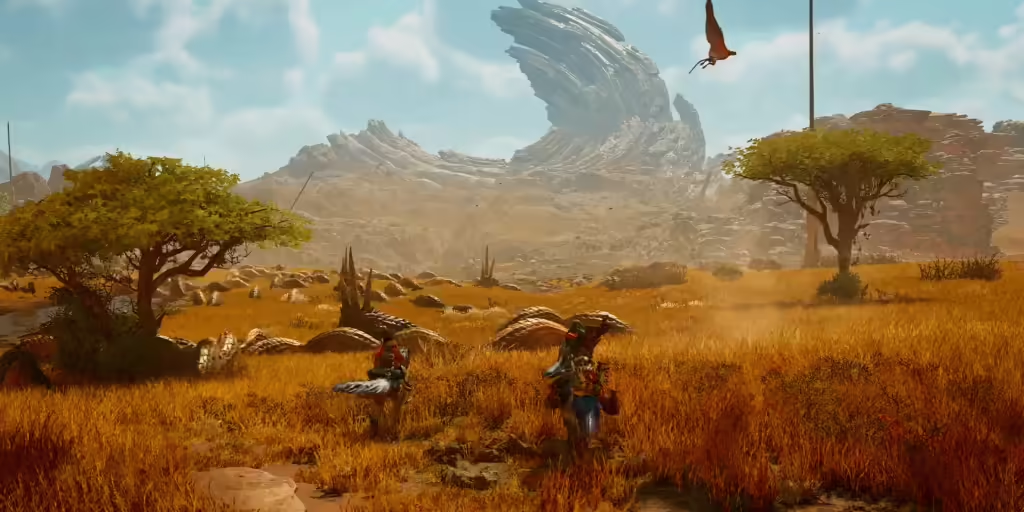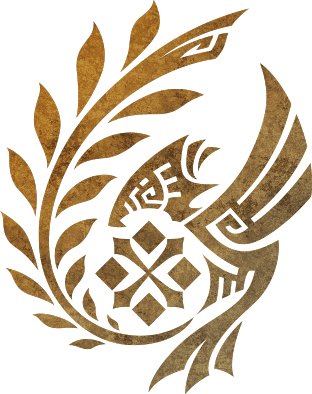
Which weapon should I try?
There’s no wrong choice when it comes to picking a weapon in Monster Hunter—each one has its own strengths and offers a unique experience. But if you’re looking for some guidance to get started, here are a few suggestions based on different playstyles:
Frontline Tank: If you want to be the sturdy wall that stands up to the fiercest charges, try the Lance or Gunlance. Both come with strong shields that allow you to block and counter even the toughest attacks, making you the perfect tank on the battlefield.
Fast and Reactive: For a quick, reactive playstyle, the Long Sword is a great pick. With its parries and Spirit Gauge system, the Long Sword lets you turn enemy aggression into powerful counterattacks, rewarding careful timing and positioning.
Ranged Control: Prefer to keep some distance? The Bow and Bowguns are excellent choices, letting you control the battlefield from afar. You can apply status effects, exploit elemental weaknesses, and even snipe weak points without getting up close.
Versatility: If you like having options in any situation, the Sword and Shield offer a balanced mix of offense and defense. You can attack, block, and even use items without sheathing, making it a favorite for players who like to adapt on the fly.
Pure Aggression: For those who thrive on relentless offense, the Dual Blades and Great Sword bring raw power to the table. The Dual Blades let you shred through monsters with rapid hits, while the Great Sword delivers massive, armor-breaking strikes for maximum impact.
No matter which you choose, each weapon has layers to discover, so pick what sounds exciting to you and dive in! You’ll find your playstyle along the way and, who knows, you may even switch it up as you get deeper into the game.
Are there good learning resources?
Absolutely! Monster Hunter has a wealth of learning resources to help you get started or refine your skills. For quick, in-depth guides, YouTube is a top resource—there are tons of tutorials covering everything from weapon techniques and combos to monster strategies (Though I like to try them fresh the first few times) and efficient farming routes. Channels like GaijinHunter, Uno Hunter, Rurikhan are well-known for their helpful Monster Hunter content, often breaking down complex mechanics into simple, digestible tips.
In addition to YouTube, the Monster Hunter Wiki is a fantastic reference for stats, monster weaknesses, and crafting materials, while community sites like Reddit and Discord groups offer support from seasoned players who love to share tips and answer questions. Capcom’s official site also has useful beginner guides to ease you into the game’s systems.
Whether you’re a newcomer or looking to master advanced techniques, these resources make it easy to get the guidance you need and join the hunt with confidence!
Are Monster Hunter games a good value?
Yes, Monster Hunter games are known for delivering exceptional value. Each game offers dozens, if not hundreds, of hours of content, with a core loop of hunting, crafting, and upgrading that keeps things fresh and rewarding. The series is designed to encourage exploration and mastery, with complex mechanics and varied weapons that provide plenty of reasons to revisit hunts and try out new strategies.
In addition to the base game, Capcom often releases significant free updates, adding new monsters, quests, and gear—giving players even more to explore without additional cost. For players who love cooperative gameplay, Monster Hunter also has a thriving multiplayer community, where teaming up with friends can make each hunt feel like a fresh adventure. So if you’re looking for a game that combines depth, replayability, and an active community, Monster Hunter is hard to beat for the price.
How hard is the game really?
Monster Hunter games can seem challenging at first, but they’re designed to be approachable for players of all skill levels. The difficulty mainly comes from learning the unique moves and patterns of each monster, rather than overwhelming enemies or harsh penalties.
Unlike some other games, Monster Hunter doesn’t punish you too severely for mistakes—you have multiple “carts” (or lives) per hunt, and if a hunt doesn’t go your way, it’s more of an invitation to strategize, try again, and improve.
Plus, there are tons of resources, from in-game tutorials to community guides on YouTube, to help you master weapons, techniques, and monsters. With time and practice, you’ll find yourself picking up skills naturally, and there’s always the option to bring along friends or AI companions for extra support. So while Monster Hunter has a learning curve, it’s more about persistence and growth than pure difficulty.
What type of community vibe are you hoping for?
We’re aiming for a welcoming and supportive community that feels like a great place to pop in after work, chat, and jump into a few quick hunts—even if it’s just for 30 minutes.
Monster Hunter is all about teamwork and shared victories, so we want this to be a space where everyone, from newcomers to veterans, can swap tips, celebrate achievements, and dive into hunts together, no matter how much or how little time they have.
Whether you’re looking for strategy discussions, hunting buddies, or just a relaxing end to your day, we want this community to feel like a friendly hub where you can unwind, connect, and enjoy the game. The goal is a positive, encouraging vibe where players can share, learn, and support each other in any way they can.
What gaming hardware do I need?
To get started with Monster Hunter, your gaming hardware requirements will depend on the specific game and platform you’re interested in. Recent entries like Monster Hunter Rise and Monster Hunter World are available on a range of systems, including Nintendo Switch, PC, PlayStation 4 & 5, and Xbox One & Series X|S.
You can find the recommend and minimum specs for Monster Hunter Wilds here.
For the best experience, especially if you’re playing on PC, aim for a setup with a mid- to high-range graphics card, a solid processor, and at least 8GB of RAM. This will ensure smooth gameplay and better graphics performance, especially during those intense hunts. On consoles, you don’t need to worry about specs as much; just pick the system that suits your preference and budget.
A good controller is also recommended since Monster Hunter’s combat mechanics often feel more natural with analog controls, although mouse and keyboard setups are supported on PC. Lastly, if you’re interested in multiplayer hunts, a reliable internet connection will make teaming up with friends or other players seamless.
Sounds great! How do I join?
For now we are invite only, but we plan to open invitations to friends of members soon.
